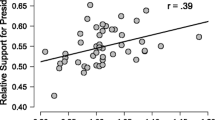Abstract
I set out and defend a view on indicative conditionals that I call “indexical relativism”. The core of the view is that which proposition is (semantically) expressed by an utterance of a conditional is a function of (among other things) the speaker’s context and the assessor’s context. This implies a kind of relativism, namely that a single utterance may be correctly assessed as true by one assessor and false by another.
Similar content being viewed by others
References
Adams E. (1998). A primer on probability logic. Palo Alto, CSLI
Bradley R. (2000). A preservation condition for conditionals. Analysis 60, 219–222
Cappelen, H. (2008). Content relativism and semantic blindness. In M. Kolbel & M. Garcia-Carpentero (Eds.), Relative truth. Oxford University Press, forthcoming.
Egan A., Hawthorne J., Weatherson B. (2005). Epistemic modals in context. In: Preyer G., Peters G. (eds) Contextualism in philosophy. Oxford, Oxford University Press, pp. 131–169
Einheuser, I. (2007). Three forms of truth-relativism. In M. Garcia-Carpintero & M. Kolbel (Eds.), Relativising utterance truth. Oxford: Oxford University Press, forthcoming.
Gibbard, A. (1981). Two recent theories of conditionals. In W. Harper, R. Stalnaker, & G. Pearce (Eds.), Ifs (pp. 211–247). Dordrecht: Reidel.
Gillies, A. (ms). On truth-conditions for if (but not quite only if).
Grice H.P. (1989). Studies in the way of words. Cambridge, MA, Harvard University Press
Kaplan D. (1989). Demonstratives. In: Almog J., Perry J., Wettstein H. (eds) Themes from Kaplan. New York, Oxford University Press, pp. 481–563
King, J., & Stanley, J. (2005). Semantics, pragmatics, and the role of semantic content. In Z. Szabó (Ed.), Semantics vs. pragmatics (pp. 111–164). Oxford: Oxford University Press (with Jeffrey C. King).
Kölbel M. (2004). Indexical relativism vs. Genuine relativism. International Journal of Philosophical Studies 12, 297–313
Lasersohn P. (2005). Context dependence, disagreement, and predicates of personal taste. Linguistics and Philosophy 28, 643–686
Lewis D. (1973). Counterfactuals. Oxford, Blackwell
López de Sa D. (2007a). The many relativisms and the question of disagreement. Forthcoming in International Journal of Philosophical Studies 15, 339–348
López de Sa, D. (2007b). Presuppositions of commonality. In M. Garcia-Carpintero & M. Kolbel (Eds.), Relativising utterance truth. Oxford: Oxford University Press, forthcoming.
López de Sa, D. (ms) (Indexical) Relativism about values: A presuppositional defense.
Lycan, W. (1993). MPP, RIP. Philosophical Perspectives.
MacFarlane J. (2003). Future contingents and relative truth. The Philosophical Quarterly 53, 321–336
MacFarlane J. (2005). Making sense of relative truth. Proceedings of the Aristotelian Society 105, 321–339
MacFarlane J. (2007). Semantic minimalism and nonindexical contextualism. In: Preyer G., Peter G. (eds) Context-sensitivity and semantic minimalism: Essays on semantics and pragmatics. Oxford, Oxford University Press
MacFarlane, J. (ms). Non-indexical Contextualism.
McGee V. (1985). A counterexample to Modus Ponens. Journal of Philosophy 82, 462–471
McKay T. (2006). Plural predication. Oxford, Oxford University Press
Nolan D. (2003). Defending a possible-worlds account of indicative conditionals. Philosophical Studies 116, 215–269
Partee, B. H. (1989). Binding implicit variables in quantified contexts. In C. Wiltshire, R. Graczyk, & B. Music (Eds.), Papers from the twenty-fifth regional meeting of the Chicago linguistic society (pp. 342–356). Chicago: Chicago Linguistic Society. Reprinted in Partee 2004.
Partee B.H. (2004). Compositionality in formal semantics: Selected papers by Barbara H. Partee. Oxford, Blackwell Publishing
Sayre-McCord G. (1991). Being a realist about relativism (in Ethics). Philosophical Studies 61, 155–176
Schlenker, P. (2003). Indexicality, logophoricity, and plural pronouns. In J. L. Benjamins (Ed.), Research in Afroasiatic Grammar II (pp. 409–428) (Selected Papers from the Fifth Conference on Afroasiatic Languages, Paris, 2000).
Stalnaker R. (1975). Indicative conditionals. Philosophia 5, 269–286
Stalnaker R. (1981). A defense of conditional excluded middle. In: Harper W., Pearce G., Stalnaker R. (eds) Ifs: Conditionals, belief, decision, chance, and time. Dordrecht, D. Reidel, pp. 87–104
Stanley J. (2007). Language in context: Selected essays. Oxford, Oxford University Press
Stephenson, T. (forthcoming). Judge dependence, epistemic modals, and predicates of personal taste. Forthcoming in Linguistics and Philosophy.
Weatherson B. (2001). Indicative and subjunctive conditionals. Philosophical Quarterly 51, 200–216
Author information
Authors and Affiliations
Corresponding author
Rights and permissions
About this article
Cite this article
Weatherson, B. Conditionals and indexical relativism. Synthese 166, 333–357 (2009). https://doi.org/10.1007/s11229-007-9283-5
Received:
Accepted:
Published:
Issue Date:
DOI: https://doi.org/10.1007/s11229-007-9283-5



